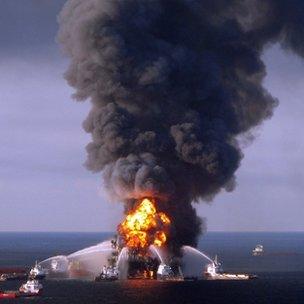BP's Deepwater Horizon settlement
- Published
- comments
In the early hours of this morning, BP took a big and expensive step towards finalising the financial bill it will face from its 2010 oil spill from the Macondo well in the Gulf of Mexico, the Deepwater Horizon catastrophe.
It has agreed to pay $7.8bn to settle claims from an estimated 110,000 people and businesses, after a week of late-night negotiations under the supervision of Judge Sally Shushan in New Orleans.

A senior BP executive told me he saw the settlement as a "big step", because it "reduces the complexity [of litigation] greatly". BP still faces cases from assorted parts of government and shareholders.
The settlement with the businesses and individuals is at the top end of what BP expected to pay. That is clear because it reduces the spare capacity from $5.5bn to $3.4bn in the $37.2bn that BP has set aside to cover all costs arising from the Deepwater Horizon disaster.
Within the $37.2bn for total estimated costs, BP allocated $20bn for a Trust that would satisfy legitimate individual and business claims and a variety of claims from state and local government. BP said this morning that "it is not possible at this time to determine whether the $20bn Trust will be sufficient to satisfy all of these claims as well as those under the proposed settlement".
BP will make payments directly under the settlement if the Trust doesn't have the money.
If the settlement is ratified over the coming month and a half, it will bring to just under $14bn the sum BP has agreed to pay out to people and firms whose livelihoods and health was damaged by the spill. A similar sum has been spent on capping the well and the clean up.
There will now be a 45-day delay to the start of the huge court case BP still faces as a consequence of the environmental disaster. In the meantime, BP's lawyers will investigate whether it will be possible to settle the claims for penalties and damages from five Republican coastal states from Texas to Florida and from the US Federal government.
The company is contesting that it is guilty of gross negligence or that it committed a criminal act. If it were to be found grossly or criminally liable, the $37.2bn charge it has made for total costs would turn out to be too little.
BP's lawyers still expect one of the biggest and most complex cases of its sort will come to court, though there is a chance - I am told - that the states will settle.
Probably the most important part of the case is being brought by the Federal Department of Justice in Washington. My very strong sense is that relations between BP and the DoJ are not good.
Today's settlement with businesses and individuals contains two agreements - one to resolve claims for economic loss and one for medical claims, such as stress, the impact of breathing in fumes, and accidents that took place in the clean-up. The seafood and tourism industries in the Gulf-coast region have been particularly badly hurt.
As part of the settlement, the fund created by BP to pay interim claims, the Gulf Coast Claims Facility, which was administered by Kenneth Feinberg, will be wound up. A court-supervised claims process will replace it, pending the creation of what BP described as "the infrastructure for the new settlement claims".
The Gulf Coast Claims Facility, under Mr Feinberg, has to date paid $6.1bn to resolve more than 220,000 claims from individuals and businesses.
There was speculation last week that Halliburton, the group which supplied the specialised cement that failed to seal the Macondo well, was also close to reaching a settlement of more than a billion dollars with plaintiffs.